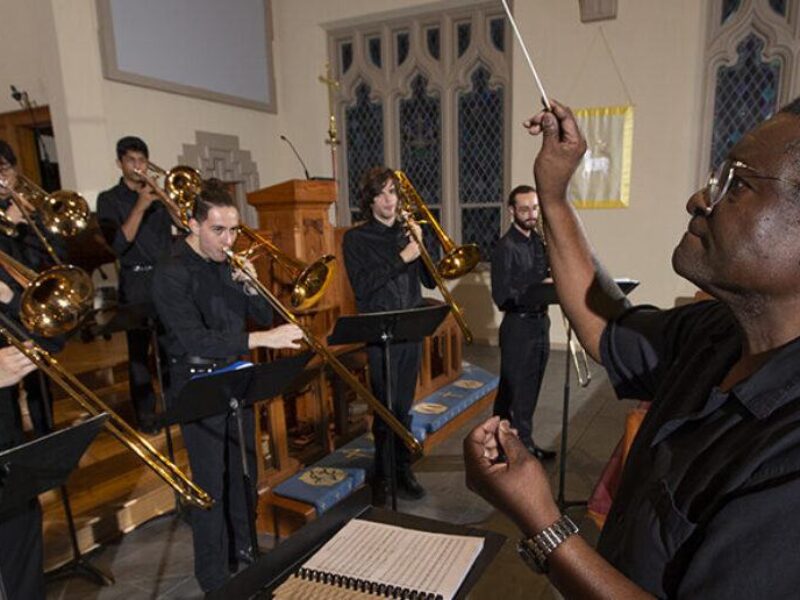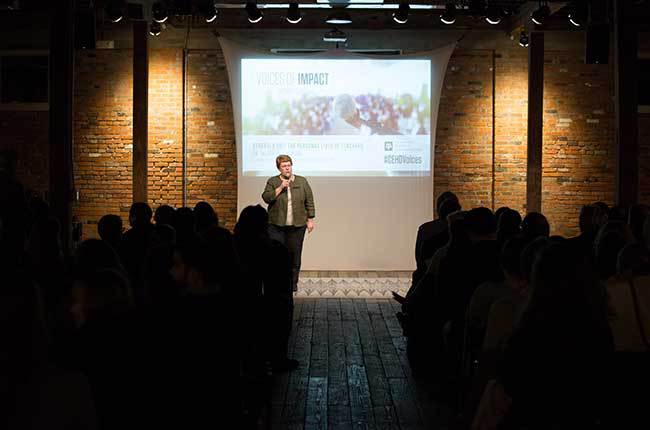
What do elementary science education, conflict management and living with chronic diseases have in common? They were all topics covered by experts at the 2nd annual Voices of Impact Speaker Series hosted by the Texas A&M University College of Education and Human Development.
In a series of 5-minute presentations, faculty experts addressed these and nine other important topics related to education or health at the TED Talk-inspired event held at the Ice House in downtown Bryan last week.
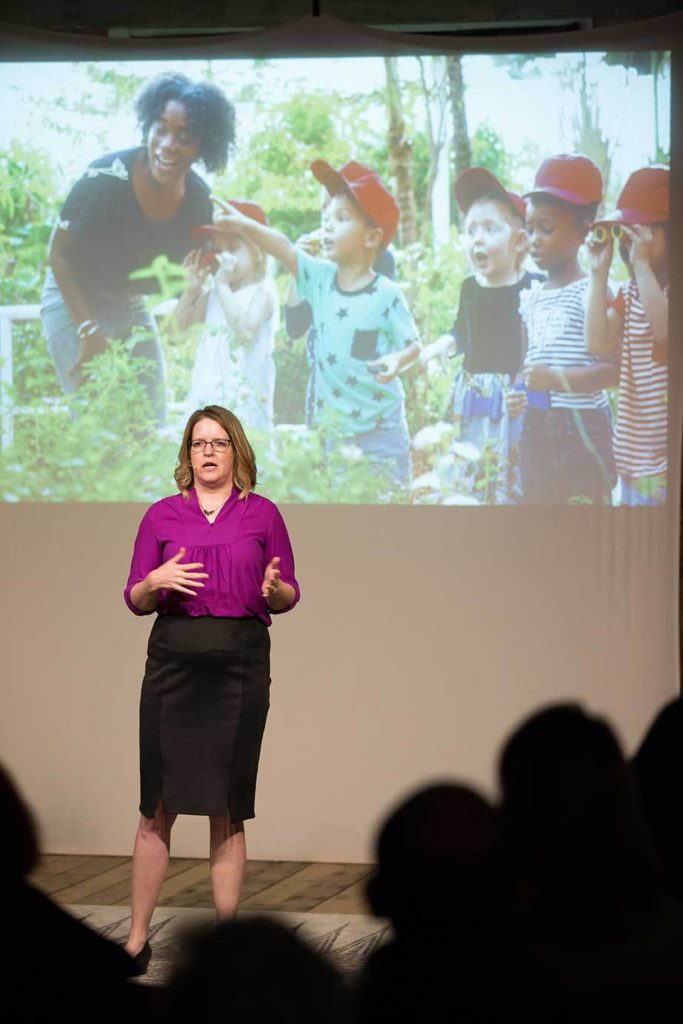
Joanne Olson, professor of science education delivered “19 Minutes and Falling” about the decline of science education in elementary schools.
Nationwide, elementary school teachers spend an average of 19 minutes per week on science education, and most of them spend that time on STEM (science, technology, engineering and mathematics) activities that do not include recognizable science concepts. This is detrimental because a study reports that more than 60 percent of scientists surveyed made the decision to pursue careers in science before the age of 11.
“So we really need to get science back into those elementary years,” Olson said. “All of us, I think, depend on it.”
And that 19 minutes is falling.
One-third of teachers nationwide report they do not teach science at all, and another one-third report that science is the subject they feel least comfortable teaching.
Olson found through her research that science education plummeted after the passing of the 2001 No Child Left Behind Act, which mandates testing in language, arts and mathematics. Science does not appear on the standardized test until the 5th grade, and as a result, many teachers of kindergarten through 4th grade students report that they do not even teach science in their classrooms. This is especially true in Texas where the outcomes associated with the high stakes tests are more consequential, she said.
The landscape of elementary science, which changed noticeably in 2001, has changed again.
Since the introduction of STEM activities to classrooms, Olson has found that instructors in 70 percent of classrooms are not teaching recognizable science concepts, meaning lessons in physics, chemistry, biology, geology or astronomy. Instead, their students are engaging in STEM exercises such as making pinball machines from cardboard or building structures with Connex kits or Legos.
“The kids were engaged in trial and error and tinkering in these kinds of activities…and the teachers told me this was a STEM activity,” Olson said. “And worse, they didn’t even notice that they [activities] didn’t include the ‘S.’”
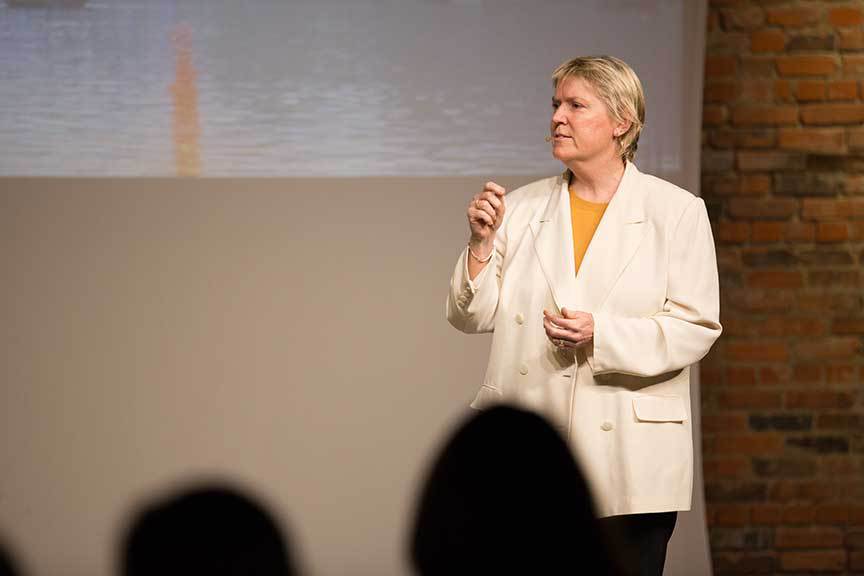
Nanc Watson, clinical professor of conflict management, delivered “Peace Through Conflict” about understanding and engaging in constructive conflict.
Understanding and engaging in conflict is a way to achieve peace during the course of one’s life.
Watson referred to a town in India where people go to die to illustrate her point. Interviews with thousands of people who traveled to that particular town in India to live the last two weeks of their lives revealed that they overwhelmingly equated dying peacefully with addressing and managing conflicts they had earlier in their lives.
“When we engage in conflict, we as individuals experience relief that we have managed that conflict instead of dreading that person at work or in our home environment,” Watson said. “And the person we are in conflict with tends to trust and have greater respect for us when we work through the conflict.”
Furthermore, she said, the organization or the family unit benefits from the conflict engagement because unresolved issues take time and energy away from productivity.
Conflict is neither good nor bad. Rather, the way people engage in conflict is either constructive or destructive.
Watson dispelled two pervasive myths about conflict, which she called the struggle between people with opposing needs, ideas, values, beliefs or goals. First, the idea that conflict should not happen is misguided, and actually, the average person engages in five to nine conflicts each day. Secondly, the notion that conflict is meant to destroy the opposition, whether a person, entity or country, is untrue.
Effective conflict management involves engaging in constructive dialogue that begins with focusing on oneself rather than the other person.
The process often involves discomfort and anxiety, so finding ways to manage physical, intellectual and emotional responses to conflict is key. This requires putting a structure in place to address the conflict and using a skill set that includes self-awareness, perspective-taking, which does not necessarily mean agreeing with the other’s point of view, and suspending judgment while listening for new information, Watson said.
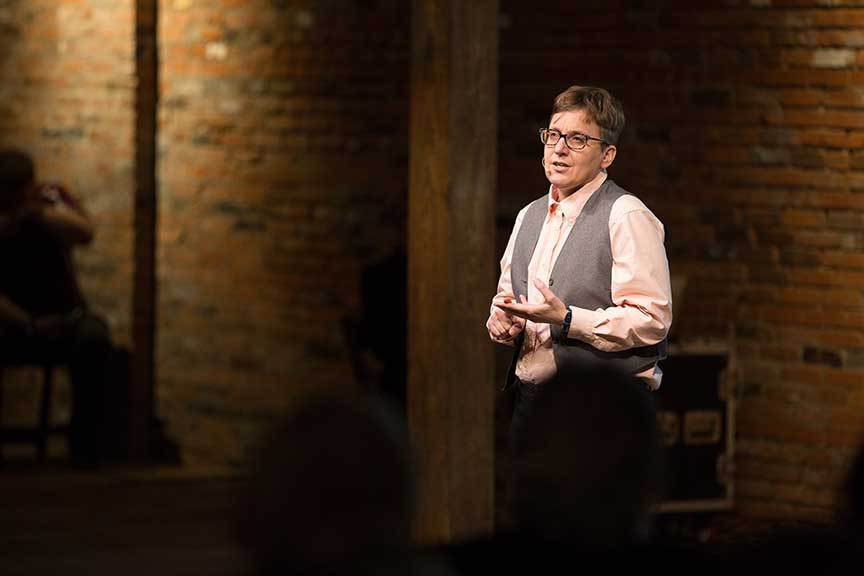
Lisa Baumgartner, associate professor of adult education, delivered “The Dragon Doesn’t Follow Me Anymore” about understanding ways people deal with chronic illness.
Approximately half of all adults living in the United States live with at least one chronic illness. Understanding the way people live successfully with these chronic diseases in their everyday lives is important in helping those who are not.
In 1996, HIV/AIDS, a once fatal disease, became a chronic illness with the advent of life-extending medications. Baumgartner interviewed 70 people living with HIV/AIDS between 1998 and 2014. She found that they dealt with their disease in five phases including diagnosis, post-diagnosis turning point, immersion, post-immersion turning point and integration.
In her study, the subjects reported reacting to the diagnosis with either shock, fear, denial or relief. Shock was most prevalent, denial lasted from six months to five years, and relief came to those who already feared they had the disease. One man whose diagnosis came after his partner’s said, “the dragon didn’t follow him anymore,” in regard to the relief he felt.
The post-diagnostic turning point happened when those living with HIV/AIDS came to the realization that their lives would continue, however long, and that they must live. This was often brought about by support from others and learning about the disease.
Immersion occurred mostly among those diagnosed before 1996. The disease was so stigmatized, even more so than now, that they found comfort in immersion, often as counselors and educators, in the HIV/AIDS community.
“They wanted to be around people who also were stigmatized and saw them for who they were,” Baumgartner said. “They handed out condoms on street corners; they educated everyone.”
The post-immersion turning point came about with life-extending medications. With more time to live, they realized that they could do more than educate others about their disease. They reconnected with people and began living their lives as they had before their diagnoses.
Lastly, integration happened when they accepted the illness as part of who they had become. Their health improved and their disease receded into the background.
“The reason we need to know more about this procedure is because a lot of us are living with chronic illness, and if we can help people, especially through those turning points, it will help us all live with chronic illness,” Baumgartner said.
The other presentations included:
- Valerie Hill-Jackson, clinical professor of critical teacher education: The occupational stress of teaching
- Patrick Slattery, professor of culture, curriculum and instruction: Engaging students through transformational learning
- John Buchanan, professor of kinesiology: How advances in virtual reality technology can aid in home rehabilitation
- Lisa Wigfall, assistant professor of health education: The importance of HPV vaccination and detection
- George Cunningham, professor of sport management: LGBT inclusion in sport
- Jan Hughes, professor emeritus: How grade retention affects educational attainment and success
- Carly Gilson, assistant professor of special education: Preparing individuals with disabilities for the workplace by improving social skills
- Tim Elliott, professor of counseling psychology: Using technology to provide mental health services to rural communities
- Jean Madsen, professor of K-12 administration: Understanding inclusion and equity in schools as student demographics change
For more on the Voices of Impact Speaker Series, visit Transform Lives. View all presentations on the Voices of Impact website.
###
Media contact: Ashley Green at 979-458-1334 or a_green@tamu.edu; or Elena Watts at 979-458-8412 or elenaw@tamu.edu
